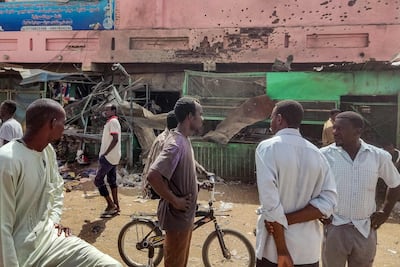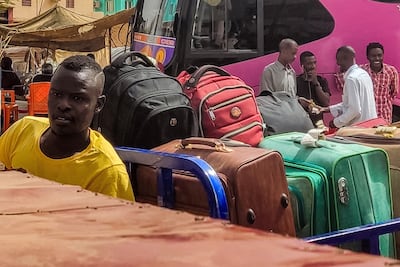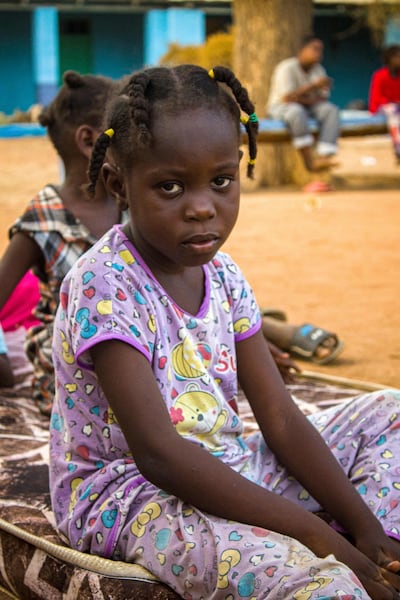Talks seeking to end Sudan's six-week war should be more inclusive and possibly involve the UN Security Council if they are to succeed, experts say.
However, they cautioned that neither of the warring sides – the army and the rival paramilitary Rapid Support Forces (RSF) – seems to have the will to silence their guns and negotiate in good faith to end a war that has already killed hundreds, injured thousands and forced at least 1.2 million people to flee their homes.
The army, led by Gen Abdel Fattah Al Burhan, pulled out of the talks on Wednesday to protest against what the military said was the RSF's failure to honour any of the short-term ceasefires to which the two sides had agreed.

The US, which together with Saudi Arabia is sponsoring the talks in Jeddah, said on Thursday it will mediate a truce only if the two sides are serious about complying with the latest five-day ceasefire, in force since Monday.
"These violations have led us as a facilitator of these talks to seriously question whether the parties are ready to take the actions needed to meet the obligations they have undertaken on behalf of the Sudanese people,” the US State department said.
Additionally, White House National Security Council Adviser Jake Sullivan said on Thursday that Washington would work with its partners to “hold the belligerent parties accountable for their unconscionable violence”.
The US accuses both sides of serious breaches of the ceasefire.
But the experts question whether the talks in their present form are capable of delivering a solution even if the army returns to the negotiating table.
"It is not possible to imagine that the Jeddah talks could restore security and stability to Sudan," said Amr Helmy, a former Egyptian career diplomat with experience in dealing with UN agencies.
"The present situation indicates that we are facing a prolonged crisis that's not showing any sign of a near-term end or even the form and nature of such an end," he said.
"The situation calls for the involvement of the UN Security Council," he said, adding that the world body's handling of the Bosnian war in the 1990s – creating humanitarian corridors and safe zones for civilians – should be emulated in Sudan.

Fayez Al Zaki, a Sudanese analyst, agrees that the Jeddah talks may be inadequate, although he is not proposing the involvement of the UN Security Council.
"Many now are convinced that this war cannot be won militarily. For it to end, it needs serious negotiations that go beyond the sponsorship of Saudi Arabia and the United States," he said.
"It requires the participation of the rest of the quartet – the UAE and Britain – plus Sudan's neighbours, particularly Egypt and Ethiopia, as well as effective Sudanese political groups."
The war in Sudan has been primarily focused in Khartoum, a city of nearly seven million people, and the turbulent Darfur region in the west of the country. Of the 1.2 million who fled their homes, more than 400,000 sought refuge in neighbouring countries, mostly Egypt and Chad.
Aside from the danger of being caught in the crossfire, the millions who remain in Khartoum are cowering in their homes, surviving on dwindling food supplies and coping with lengthy and frequent power failures.
Most health facilities are out of service and looting, blamed on RSF fighters and criminal gangs, is widespread.
The looting has targeted homes, foreign embassies, shops and relief food stocks stored in UN warehouses.
But despite the widespread suffering and the displacement of hundreds of thousands, neither Gen Al Burhan nor his rival, Gen Dagalo, appear willing to stop fighting.
"The Jeddah talks are moving slowly, but it's the only feasible avenue at present," said prominent Sudanese analyst Osman Al Mirghany. "Both sides want peace but the military situation on the ground is influencing their negotiating position.
"The army is in a generally better position militarily, but seems to be waiting for a favourable turning point in the fighting before it fully commits to negotiating a settlement," Mr Al Mirghany said.

Mr Al Mirghany explained that Gen Al Burhan might pursue a resolution that removes the root causes of the war.
Foremost among these is Gen Al Burhan's insistence that the RSF be integrated into the armed forces as part of Sudan's democratic transition which, ironically, was derailed when he and Gen Dagalo jointly led a military coup in 2021 that toppled a civilian-led government.
Mr Al Mirghany's assertion on the army's position is borne out by comments made by Gen Al Burhan this week, when he told cheering soldiers that the fighting will be pressed on until the last soldier.
Gen Dagalo, on the other hand, has not been seen in public since the early days of the war, fuelling speculation that he was seriously injured.
However, his older brother and second-in-command, Abdel Rahim Dagalo, appeared in a video shared online on Wednesday in which he delivered motivational comments to his fighters and accused Gen Al Burhan of being loyal to the regime of ousted dictator Omar Al Bashir.
The war, meanwhile, continues to take its toll on civilians.
The UN World Food Programme chief, Cindy McCain, tweeted on Thursday that the agency's food warehouses in El Obeid, south-west of Khartoum, were being looted.
"Food for 4.4 million people is at stake," he said.
In Khartoum, residents reported a surge in fighting early on Thursday in parts of the capital, which is made up of Khartoum and its twin cities of Bahri and Omdurman around the confluence of the Blue and White Niles.
They said heavy artillery fire could be also be heard in northern Omdurman and intermittent firing in southern Bahri.
Clashes continued in southern Khartoum, where a neighbourhood committee reported at least 18 civilian deaths and the injury of 106 in the crossfire, which included stray artillery shells.


